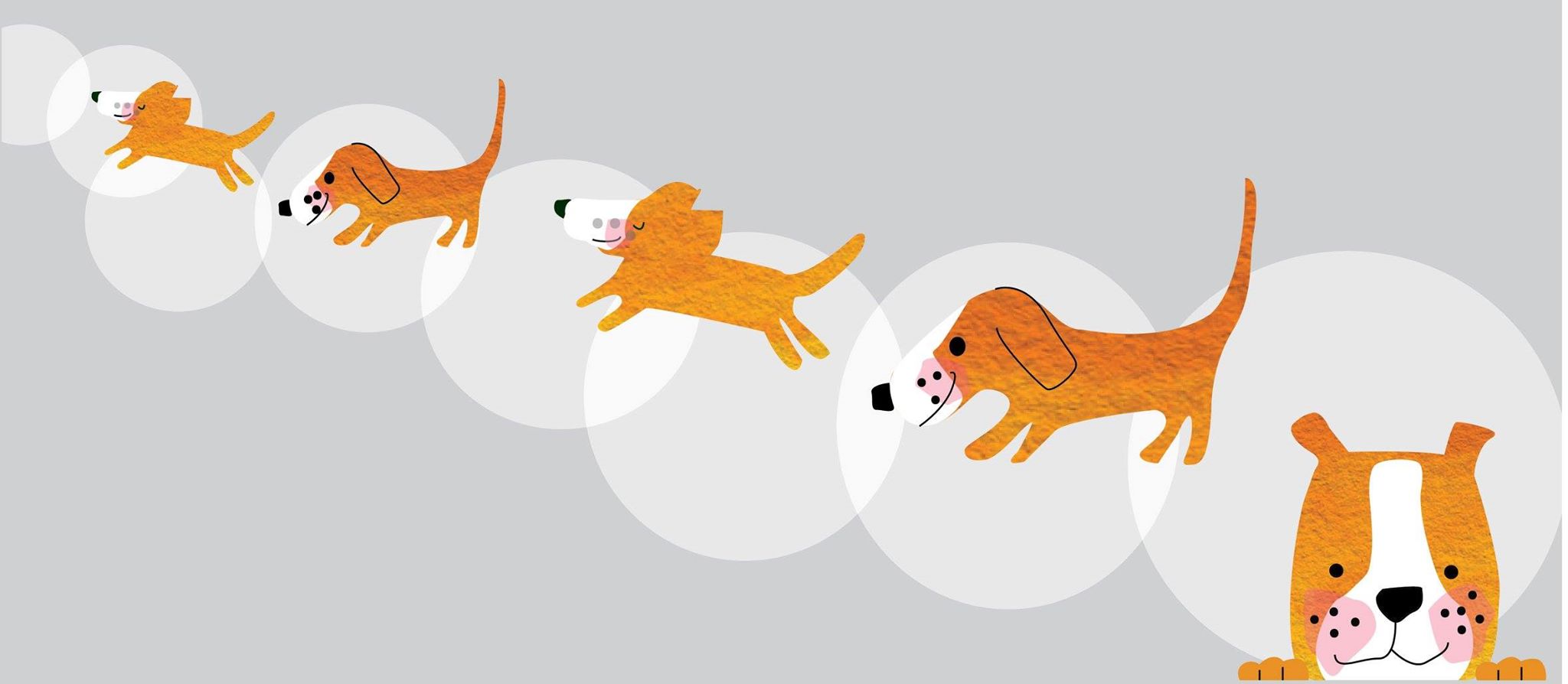Ryan Kindel graduated from the USC Dornsife College in 2014 with a degree in Creative Writing. Now he lives in Seattle and writes full-time, with plans to pursue an M.F.A. in Fiction. When he’s not writing, Ryan can be found reading, cooking, playing online video games with his far-flung brothers, and taking catnaps with his cat. (Ou peut-être: je suis son homme.) Also, he’s a proud alumnus of Scribe’s editorial team, and he tips his hat to this publication’s excellent and hardworking team of editors and faculty advisors.
Note: The below is an excerpt of Ryan Kindel’s longer paper. Please contact Scribe at scribe.usc@gmail.com for the full paper, as well as sources.
But, you may say, Virginia Woolf was not a dog. Didn’t Nicole Kidman play her in that movie? You do know that Woolf is spelled with two o ’s, right? I will try to explain. I have been thinking about the subject of nonhuman animals in Woolf’s writing. I was thinking about that subject today while sitting at a table outside a café, when a dog padded up along the sidewalk and paused by my table. She was chocolate black-brown and had what appeared to be a panty-liner stuck to her right flank. The dog did not look at me but stretched on the sidewalk, as if displaying the panty-liner, and I found myself wondering: Is she showing me because she is proud of the garment and she wants me to admire her? Or because she is humiliated and wants me to tear it away?
As the dog padded away, I realized: What questions for a vegan to ask himself!
I knew then that I had learned something from reading Virginia Woolf’s A Room of One’s Own (1929) and Flush (1933), a very real and even useful lesson: I had learned how to be animal.
Perhaps your first response to my epiphany, that I am animal, is: Why? Nobody wants to be animal. But in A Room of One’s Own , as Woolf’s fictional narrator shows, men make women into animals whether or not they want to be. “Are you aware,” the fictional narrator asks her female audience, “that you are, perhaps, the most discussed animal in the universe?”1 Later, the narrator describes a centuries-old tendency in men’s artistic criticisms, in which the woman artist is equated with a dog, and then:
here, I said, opening a book about music, we have the very words used again in this year of grace, 1928, of women who try to write music. . . . ‘Sir, a woman’s composing is like a dog’s walking on his hind legs. It is not done well, but you are surprised to find it done at all.’
Male critics use the dog-woman simile to signify woman’s pathetic attempt to do what only man can do. Jacques Derrida notes that “the list of what is ‘proper to man’ always forms a configuration . . . it can never be limited to a single trait and it is never closed.”3 For example, he argues that the animal’s inability to feel ashamed of its own nakedness is at the center of one such configuration, i.e., “Man would be the only one to have invented a garment to cover his sex.” (4) In the above passage, the configuration of what is “proper to man” is artistic, and because the dog cannot make art, the woman, being like a dog, is excluded from man’s acceptance even before she makes art.
This artistic self-doubt is still a fact of life for the woman in 1929. In A Room of One’s Own, Woolf’s narrator elucidates this when she compares the man/woman relationship with the man/lab animal relationship:
“surely it is time that the effect of discouragement upon the mind of the artist should be measured, as I have seen a dairy company measure the effect of ordinary milk and Grade A milk upon the body of the rat.” (7).
This experiment serves as a dual metaphor; it is the narrator’s experiment—she will go on in the essay to examine how discouragement makes women “timid and small” and how encouragement makes them “glossy, bold, and big” (8)—but also an age-old grand experiment, controlled by men, who have been meting out discouragement to the woman and thereby leaving her “timid and small” as an artist. Hence, as the narrator says at the end of A Room of One’s Own, the woman has not had “a dog’s chance of writing poetry” (9).
The concept that the animal is less than the human existed in ancient folklore (10), and was solidified in Western thought by Descartes’s “verdict of an unbridgeable hiatus between humans and animals” (11). Moving forward to the nineteenth century, we reach Darwin’s finding that the human is fundamentally animal, which, as Warner notes, created tremendous unease; she says (writing in 1994), “our evolutionary proximity to the apes caused horror in the last century” (12). Moving forward a few years in Woolf’s career, to Flush (1933), we see how man’s recognition of his own animal nature doesn’t halt but rather complicates his attempts to position others as his inferiors. To that end the narrator of Flush—described only as “the biographer” (13)—depicts character differences between people in terms of dog breeding.
The nonhuman animal, like the woman, is also subjected to humiliation. At one point later in the text, AROO’s narrator recalls reading a book in which a man said it was
impossible for any woman . . . to have the genius of Shakespeare. . . . He also wrote to a lady who applied to him for information that cats do not go to heaven, though they have, he added, souls of a sort. How much thinking those old gentlemen used to save one! (34)
In this passage, three kinds of denial—women cannot be Shakespeare, cats do not go to heaven, women cannot think for themselves—are bound up in one figure, a monolithic “old gentleman” dictating who can and cannot step on his plot of grass. The narrator’s ironic exclamation at the end serves as a rejection of the trickle-down philosophizing which denies women the chance to be Shakespeare or think for themselves, and also as a rejection of the old gentleman’s presumption that nonhuman animals are spiritually inferior to the human.
The invocation of “heaven” here is a significant echo. Earlier in the text, the narrator had said that after the Oxbridge meal, she feels as though “We are all going to heaven” (35). After the women’s college meal, she feels as though “We are all probably going to heaven [emphasis Woolf’s]” (36). The meal fed to dogs, by contrast, affords no salvation at all. “Women,” the narrator says, “have served all these centuries as looking-glasses possessing the magic and delicious power of reflecting the figure of man at twice its natural size” (37). Animals serve the same purpose.
In a passage from A Room of One’s Own, Woolf speaks to that self-aggrandizing impulse among men, writing that women:
will pass a tombstone or a signpost without feeling an irresistible desire to cut their names, as Alf, Bert or Chas. must do in obedience to their instinct, which murmurs if it sees a fine woman go by, or even a dog, Ce chien est à moi [i.e., this is my dog]. And of course, it may not be a dog . . . it may be a piece of land or a man with curly black hair (57).
In her reading of this passage, Goldman notes that the dog here is working metaphorical overtime, simultaneously representing women, slaves, and men who, like “dogs pissing on tombstones and signposts,” want to claim ownership over everything they see (58). But the passage itself does not merely animalize; it is also about animalization. The syntactic joke played by the narrator—“murmurs if it sees a fine woman go by, or even a dog, Ce chien est à moi”—addresses men’s animalization of women and their denial of female education/genius/thought. The man’s instinct is saying in equal parts, not just “This is mine” but also “This is a dog.” The narrator’s self-correction, “it may not be a dog,” then, not only means, the man may be claiming ownership of something else , but also: it may not really be a dog (i.e., it may really be a “woman” or a “man with curly black hair”). The portrayal of men as animal-machines acting “in obedience to their instinct” is a redirection of man’s own reductive animalization onto man himself.
This was the nature of my café epiphany: a sense of affiliation with the whole kingdom Animalia, a sense that despite my sex, I stand with the dogs and the Woolves against the man-machine, that we will no longer allow ourselves to be plastered with panty-liners (or, as the case may be, that we will display our panty-liners with defiance). Here was I (call me Jacques, Virginia, Flush—it is not important) joining the insurrection.





Leave a Reply